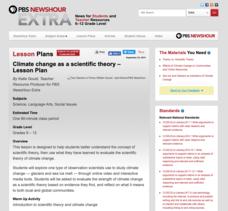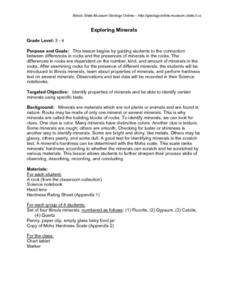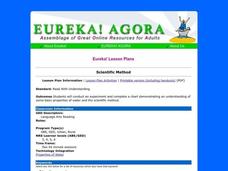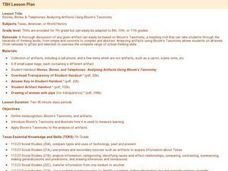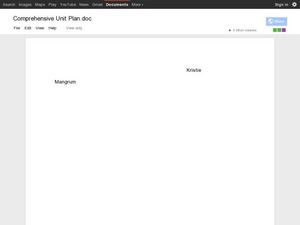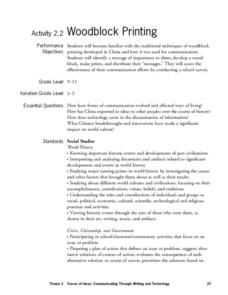PBS
Climate Change as a Scientific Theory
Get your class thinking about climate change as a scientific theory. Guided by a handout, emerging earth scientists read articles and take notes about glaciers and sea ice. To conclude, they write an evaluation of the evidence for...
Curated OER
Tools, Technologies and Inventions through the years
5th graders will gain an understanding of how, what, and why people invent tools. This PowerPoint provides a complete description of what tools are, types of tools, why we make tools and what impact they have had on society. There are...
Curated OER
Scientific Method
Students conduct an experiment and complete a chart demonstrating some of the basic properties and components of water via the scientific method. They encompass strategies such as questioning, making predictions, comparing/contrasting...
Curated OER
Oil and its Everyday Uses
Explore the properties of oil through an experiment. They use the scientific process to investigate oil, participate in experiments, watch videos,and use information from the internet to determine how oil has changed our everyday lives.
Curated OER
Exploring Minerals
I love this geology lesson plan. Third and fourth graders look at the connections, and the differences, between rocks and minerals. Learners are charged with identifying specific rocks and minerals, learning how to properly use...
University of North Carolina
Sciences
Science writing follows many of the same principles as writing in language arts, but some structural details differ. Individuals read an online science handout that covers how to write with precision, choose appropriate details, and use...
Curated OER
Charles Darwin
High schoolers produce a newspaper describing the times during which Charles Darwin introduced the theory of natural selection. For this evolution lesson, students make observations and explore the role of observation in Charles Darwin's...
Curated OER
Measure Up!
Discover ways to measure items without standard tools. For this measurements lesson, learners estimate how long certain objects are by measuring with a non-standard measuring tool. Students check their estimates with a ruler and share...
Smarter Balanced
Classifying Vertebrates
What features do scientists use to classify animals into groups? Class groups examine a series of paired images of vertebrates (a bass and a trout, a toad and a newt, a crocodile and a tortoise, an owl and a robin, a tiger and a bear)...
Curated OER
Scientific Method
Young scholars explore the steps in the scientific methods. Through activities, students discover the scientific is a tool for solving problems of any kind. Young scholars will fill out a scientific method chart, and determine what...
Curated OER
Writing in Scientific Notation
Students discover number sense by completing a math worksheet. In this scientific notation lesson, students identify the purpose for writing in scientific notation and practice writing large numbers in scientific notation. Students...
Curated OER
Maus: Cubing Questioning Strategy
Maus is the text for a postreading activity that has class members using a cubing strategy to analyze, in depth, topics (racism, past and present, forgetting/remembering the Holocaust, representing the Holocaust) associated with Art...
Novelinks
The Adventures of Tom Sawyer: Cubing Strategy
The toss of a die determines what questions your pupils will answer in this lesson. Learners respond to questions based on Bloom's taxonomy, discussing The Adventures of Tom Sawyer with classmates along the way. They finish by writing up...
Curated OER
Out of the Dust: Questioning Strategies
Bloom's Taxonomy is a great way to address the many levels of comprehension. With explanations and examples of each level, you can create questions that focus on knowledge, comprehension, application, analysis, synthesis, and evaluation.
Curated OER
Stones, Bones & Telephones: Analyzing Artifacts Using Bloom's Taxonomy
Seventh graders define metacognition, Bloom's Taxonomy, and artifacts. They, in groups, try to identify a mystery artifact using the Artifact Analysis sheet. They present their findings to the class.
Curated OER
The Life Cycle of the Mealworm
Fourth graders provide a habitat for live mealworms and observe their life cycle. In this animal life cycle and scientific inquiry lesson, 4th graders create a habitat for a live mealworm and observe and record related data as it grows....
Curated OER
Diffusion
Students design and carry out an experiment according to the scientific method. The experiment must test the effects of time and concentration on the rate of diffusion of potassium permanganate into potato cubes. After performing the...
Curated OER
Death On Board La Belle: Finding Clues from Old Bones
Young scholars practice analyzing skeletal remains for clues by using the Internet. For this scientific investigation lesson, students research the La Belle shipwreck using the Internet and written materials, later completing a Skeletal...
Novelinks
Maniac Magee: Discussion Questions
Why did they say that? What did they mean? How did they feel? Using the six levels of Bloom's Taxonomy, challenge your young readers to answer the comprehension questions about chapters 41 and 42 of Maniac Magee by Jerry Spinelli. Each...
Curated OER
Do Touch!
Students explore the sense of touch. They investigate unknown solids using the sense of touch. Pupils use their senses of touch to match feely gloves. Students explore body parts, by tracing their hands and feet on paper. They create a...
Curated OER
Woodblock Printing: Early Printing Traditions in China
Students examine important role of woodblock printing in Chinese history, identify message important to them, and create woodblock prints to gain first-hand understanding of how it was used as tool for communication.
Curated OER
The Old Man and the Sea: Questioning Strategies
Readers learn to ask questions about text with an activity based on Ernest Hemingway's The Old Man and the Sea. As they read, class members craft questions based on Bloom's Taxonomy and then find the answers themselves.
ReadWriteThink
Persuasive Essay: Environmental Issues
Young environmentalists learn how to craft a persuasive essay about an environmental issue they consider important. After studying the components of a persuasive essay and examining a student model, writers brainstorm possible topics and...
University of North Carolina
Psychology
Psychology, the scientific study of the human mind and behavior, is a popular major for many college students. An informative handout outlines common assignments in psychology courses. Scholars see how to design a research proposal,...


